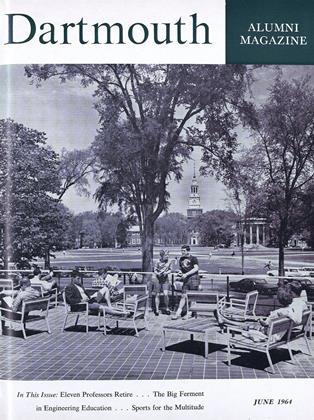By Richard Eberhart '26.New York: Oxford University Press, 1964.114 pp. $4.75.
Of those American poets who began publishing in the 1930's, it is surely Richard Eberhart who commands the most respect today. His latest book will enhance his stature and delight his readers.
Among the varied poems in this volume are some interesting and not equally successful experiments in form, diction, sound, and meter. More frequent, however, are those poems which develop the meditative strain in which Eberhart has long excelled. It is one of this poet's triumphs to have found his strength early and to have retained it through the years; the reader can detect influences - Blake, Wordsworth, Whitman, Stevens - but the voice and style are uniquely and distinctively Eberhart's.
Love and death are major recurrent themes in these meditative poems. Many, like the early, famous, and characteristic "Groundhog" (pub. 1937), are prompted by experience and centered on the plight of man-in-nature, mortal and transient. Man-in-nature must constantly confront death, the more so as he loves life: "Acceptance is the beginning of wisdom," Eberhart insists. And love? In lines suggestive of Blake, Eberhart writes, "Individuation is the way to the universal, /Love is the symptom of life's energy." The poet finds his surest affirmation in the third major theme of his meditations, inseparable from the other two, poetry and the imagination:
And is art itself not a triumph of nature, Before the worm takes over, before the breakneck tomb?
Probably the finest Eberhart is this, the meditative poet who is most effective when he writes simply and directly in language charged with the urgency of expression, as in "Sea Burial from the Cruiser Reve." Such poetry is deceptively simple, precisely the sort that readers are sure they could write, if only they could spare the time. Simplicity like that of Eberhart at his best is, however, born of the highest art, for lesser skills will turn the direct, forceful style into the flat, prosaic statement. Although Eberhart, like any other fine poet, can have his moments of flatness, it is clear that his Quarry is deeply veined with the imaginative excitement of language that distinguishes poetry from scannable words.
Department of EnglishBrown University
 View Full Issue
View Full Issue
More From This Issue
-
 Feature
FeatureThe Big Ferment in Engineering Education
June 1964 By DAVID ALLISON, -
 Feature
FeatureA Teacher's Real Reward
June 1964 -
 Feature
FeatureSports for the Multitude
June 1964 By LARRY GEIGER '66 -
 Article
ArticleTHE UNDERGRADUATE CHAIR
June 1964 By DAVE BOLDT '63 -
 Class Notes
Class Notes1920
June 1964 By CHARLES F. MCGOUGHRAN, JHON S. MAYER -
 Class Notes
Class Notes1930
June 1964 By WALLACE BLAKEY, ARTHUR M. BROWNING
ROBERTS W. FRENCH '56
-
 Letters to the Editor
Letters to the EditorA Fluxus Ruckus
December 1992 -
 Article
ArticleWith the D.O.C.
January 1956 By ROBERTS W. FRENCH '56 -
 Books
BooksA YEAR AND A DAY.
OCTOBER 1964 By ROBERTS W. FRENCH '56 -
 Books
BooksTHE MEANING OF MODERN POETRY.
MAY 1965 By ROBERTS W. FRENCH '56 -
 Books
BooksRICHARD EBERHART: SELECTED POEMS 1930-1965.
DECEMBER 1965 By ROBERTS W. FRENCH '56 -
 Books
BooksTHIRTY-TWO DARTMOUTH POEMS. Ed.
MARCH 1966 By ROBERTS W. FRENCH '56
Books
-
 Books
BooksFACULTY PUBLICATIONS
June, 1915 -
 Books
BooksFaculty Publications
January 1933 -
 Books
BooksTHE NEW YORK TRIBUNE SINCE THE CIVIL WAR
February 1937 By Eric P. Kelly '06 -
 Books
BooksLET IN THE SUN
NOVEMBER 1964 By GEORGE P. THERIAULT '33 -
 Books
BooksMIGRATION AND THE SPREAD AND GROWTH OF URBAN SETTLEMENT
JULY 1966 By JOHN W. SOMMER '60 -
 Books
BooksTHE AMERICAN INDIAN: A RISING ETHNIC FORCE.
May 1974 By MICHAEL A. DORRIS

